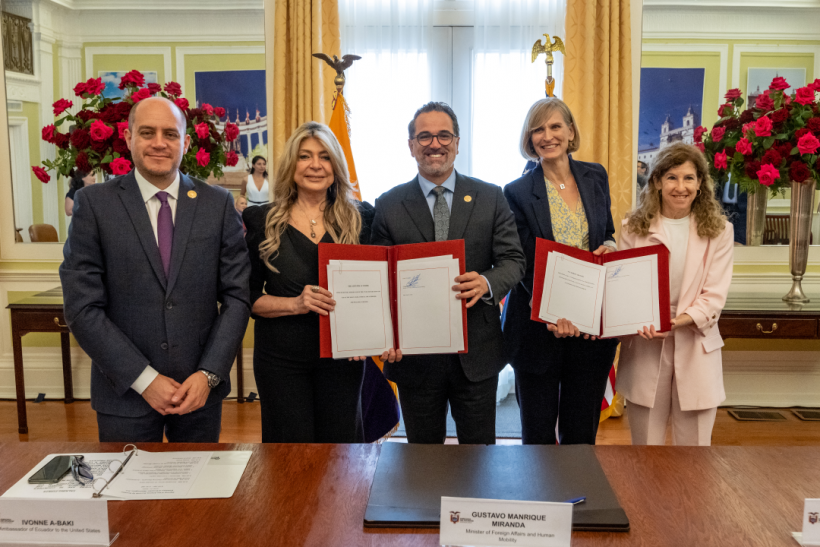Another country has signed NASA's Artemis Accords.
Officials from Ecuador's government have recently signed the Artemis Accords, making it the 26th country to do so; it joins the 61 other countries in safeguarding space for future exploration.
Ecuador, a South American country, doesn't have a major presence in space, though it did establish a space agency in 2007, per Space News.
Ecuador Artemis Accords Signing Details

From left to right, Ecuador Minster of Production, Foreign Trade, Investments and Fisheries Julio José Prado, Ambassador of Ecuador to the United States Ivonne A-Baki, Ecuador Minister of Foreign Affairs and Human Mobility Gustavo Manrique Miranda, U.S. Department of State Director of the Office of Space Affairs Valda Vikmanis Keller, and NASA Associate Administrator for International and Interagency Relations Karen Feldstein, pose for a photo during an Artemis Accords signing ceremony, Wednesday, June 21, 2023, at the Embassy of Ecuador in Washington.
NASA mentioned in its latest blog post that Ecuadorian Ambassador to the US Ivonne A-Baki had signed the Artemis Accords in a signing ceremony at the Ecuador Embassy in Washington.
A-Baki is joined by Julio Jose Prado and Gustavo Manrique Miranda, Ecuador's Minster of Production, Foreign Trade, Investments and Fisheries and Minister of Foreign Affairs and Human Mobility, respectively. US Department of State Director of the Office of Space Affairs Valda Vikmanis Keller and NASA Associate Administrator for International and Interagency Relations Karen Feldstein witnessed the signing during the ceremony.
A-Baki mentioned in a statement that Ecuador signing the Artemis Accords sends a "powerful" message to the international community that the Ecuadorian government is open to innovation, investment, workforce development to promote sustainable growth, and international collaboration to help solve "Humanity's greatest challenges." The signing also meant to show that the Ecuadorian government is committed to pursuing cutting-edge efforts in technology, A-Baki added.
Feldstein agrees with the Ecuadorian ambassador - she stated that by signing the Artemis Accords, Ecuador adds its voice to a "diverse and growing set of nations committed to the notion that humanity's rapid expansion into space, toward the Moon and destinations beyond, is peaceful, safe, and in full accordance with international law."
Read More: OceanGate's Former Employee Fired for Raising Safety Concerns About Submersible in 2018
What Are The Artemis Accords?
The Artemis Accords are a set of principles NASA established in coordination with the US Department of State in 2020 and seven other founding member nations, guiding space exploration cooperation among those that signed it, including those participating in its Artemis program.
Countries that signed the Artemis Accords are not necessarily required to participate in the effort to reach space. Rather, it reinforces and implements key obligations in the 1967 Outer Space Treaty, which dictates that space explorations are carried out for the and in the interests of all countries, per the UN Office for Outer Space Affairs.
The Treaty also stated that outer space would be Humanity's province and free for exploration and use by all nations,
NASA expects that additional countries will sign the Accords in the months and years ahead; those that signed the Accords prioritized having more countries not traditionally seen as space players to sign the Accords. According to an interview with Jennifer Littlejohn, acting assistant secretary of state for oceans and international environmental and scientific affairs, one working group of member countries, led by Brazil and Poland, was examining how to attract more emerging space nations and overcome any obstacles to them signing.
While the Accords have not resolved some space-related issues, like space resource utilization, Mike Gold, chief growth officer at Redwire and a former NASA official who spearheaded the development of the Accords in 2020, said a lack of a resolution is necessary to create a "big tent" of countries that can later resolve such sticking points.
Related Article: Czech Republic Foreign Minister Signs Artemis Accords










